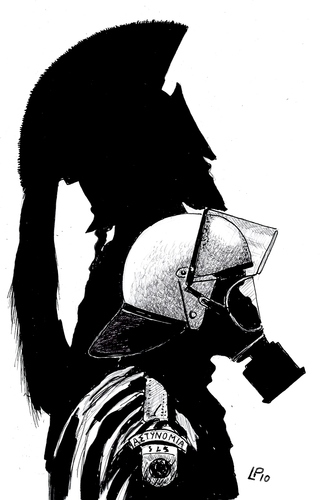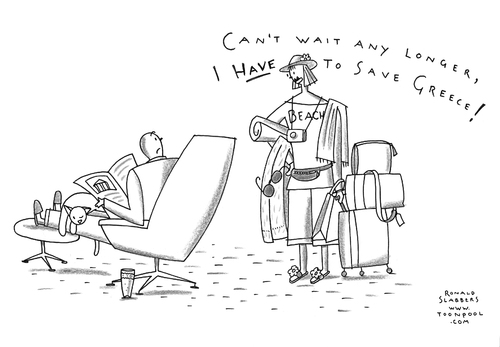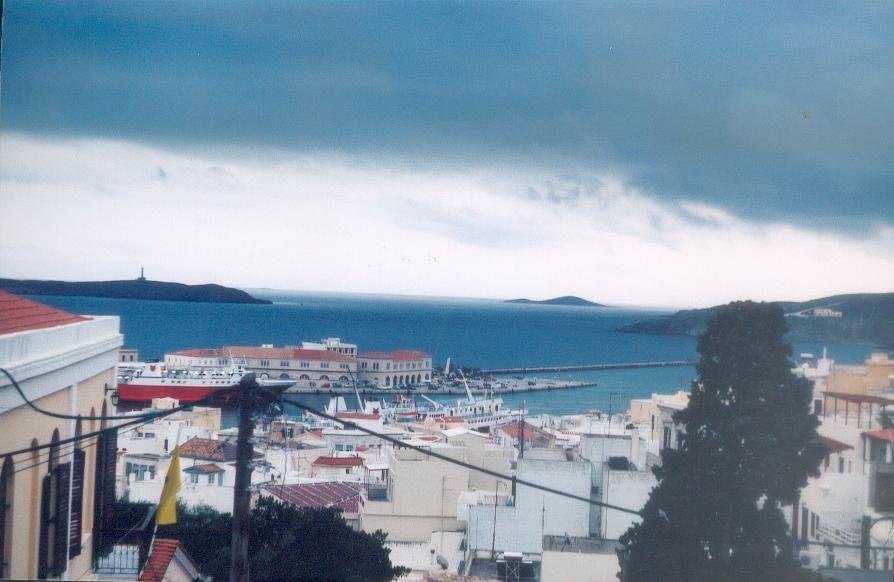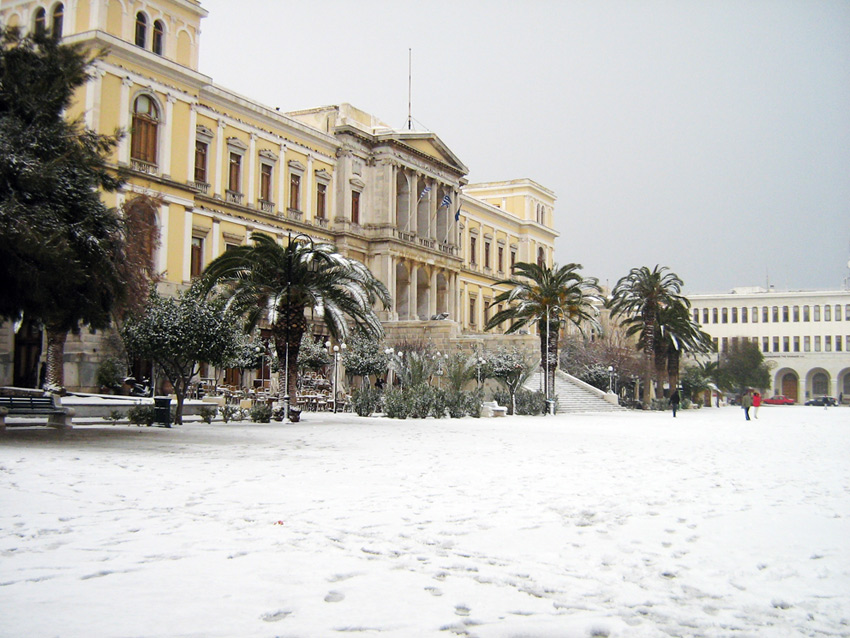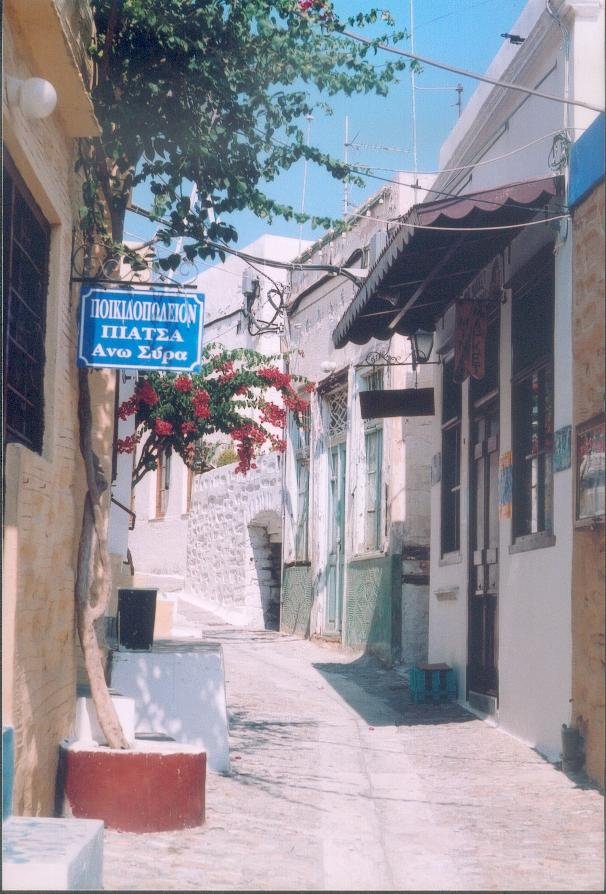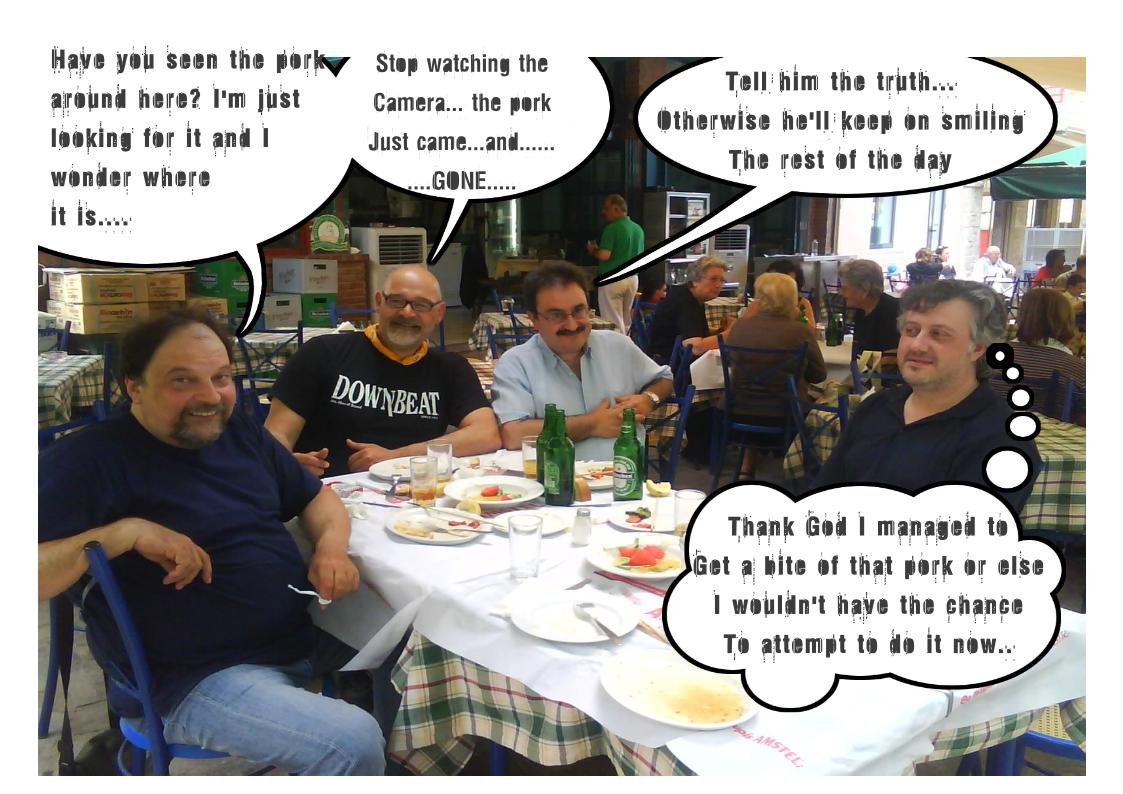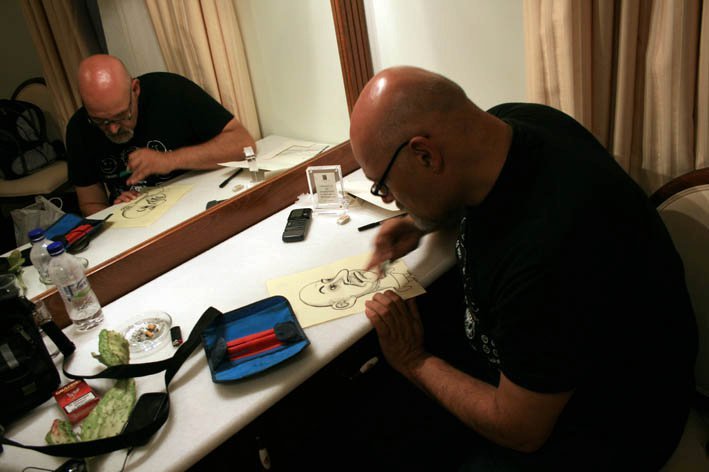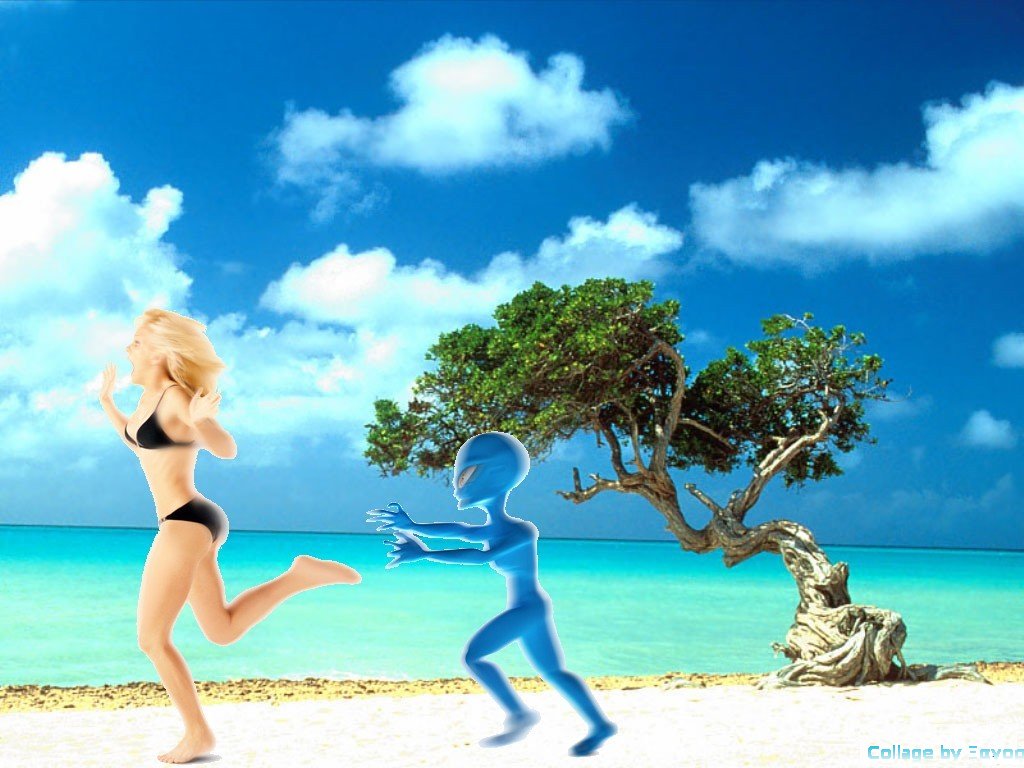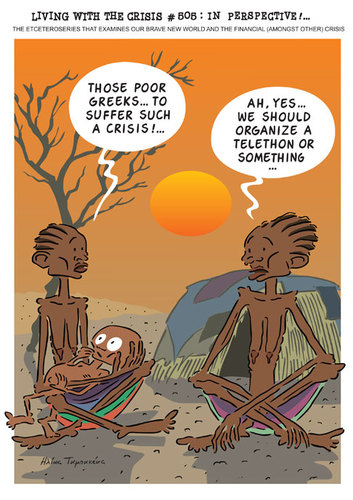Interview with Greek Professor of Modern and Contemporary History Aristotle Kallis (41), living in the United Kingdom and teaching at the Lancaster University
toonpool.com: “Zorba the Greek“, written by Nikos Kazantzakis, is a very famous Greek novel and a treasure of world literature, of course also world-renowned as the film of the same name (1964) starring Anthony Quinn. In that story Zorba has to repair a collapsed mine in the Greek countryside. In order to do that, he goes downtown to purchase building material. But he goes to the dogs with a fast woman, with drinking, dancing and sleeping, and he blows all the money – even though he’s responsible for the country people who subsist on wages from working in the mine. Though he’s penniless, he doesn’t surrender: he constructs a ropeway to transport logs from a mountain above the mine, in order to use them as supporting pillars. His undaunted optimism is so likeable – but during the first test run, the ropeway implodes in a big noisy crash – a complete disaster. Aristotle, do you think: Yep, that’s Greece! Is it an early omen for the current situation of the country? The Greeks are in love with life as the story says, but – what the heck! – they never become discouraged by failures, catastrophes or death, and if they fail, they simply get up and start over. Is this the typical Greek mentality, or have the Greeks lost their characteristic optimism since becoming embedded in the euro zone?
Aristotle: You mention Zorba by Kazantzakis – one my favourite authors’ least favourite book. Generations of Greeks grew up with this image of the one who knows better, who does things in the most unorthodox manner, who tries and fails and tries again and fails better (one of my favourite quotes by Beckett!). The story is accurate in so many respects, not all of which are positive: the maverick, yes, full of love for life, ready to try the most extraordinary thing and fail but then get up as you say and try again; the person who follows a bizarre inner voice, the thrust of emotions, the exaggeration of language, the harshness of the Greek summer landscape. But there is a side to the stereotypical Zorba that’s far from flattering: the person who does not recognise rules and is willing to find excuses to bend them to their benefit; who defies reason and celebrates flight from rationality; who is convinced of their intelligence against all odds, even if reality crushes them; who thinks first and foremostly about themselves; who embrace exaggeration and tragedy even if this means that they themselves will be crushed in the end. But Zorba (and, let’s face it, most people know the cinematic rather than the literary hero) is of course a stereotype, a caricature with deliberately blown-up charisma and flaws. He is a penniless bon-viveur, a man of extreme passion and clouded judgement, a blinded individualist, a charming crook. He is the epitome of human contradiction.
 The Greeks of 2012 are far less enamoured with life, even if they have not entirely lost their knack for enjoyment. Greeks today are confronted with a very tangible and debilitating reality – of lost jobs and reduced wages, of closed shops and wounded pride, of real insecurity and a sense of profound decadence. I travel to Greece every two or three months- and I saw a very real difference in the last year or so. People feel trapped, cornered, trashed, fooled – it does not matter if they really are any of these things; they believe they are, they think they are, and this is what matters to them. This is the kind of psychological state that allows false prophets to flourish and makes people willing to worship them temporarily.
The Greeks of 2012 are far less enamoured with life, even if they have not entirely lost their knack for enjoyment. Greeks today are confronted with a very tangible and debilitating reality – of lost jobs and reduced wages, of closed shops and wounded pride, of real insecurity and a sense of profound decadence. I travel to Greece every two or three months- and I saw a very real difference in the last year or so. People feel trapped, cornered, trashed, fooled – it does not matter if they really are any of these things; they believe they are, they think they are, and this is what matters to them. This is the kind of psychological state that allows false prophets to flourish and makes people willing to worship them temporarily.
Greeks also love pompous, pulsating rhetoric. They have an inflated collective ego – from history primarily but also from a sense of perseverance, against all odds. They are the archetypical proud, morally unassailable victims of a tragedy. They thrive on exaggerated rhetoric, on declarations of national bravado, on a kind of almost childish obstinacy when confronted with their own failings. An eternal teenager mentality if you wish, unwilling to heed the boring advice of their elders, convinced they know better, almost relieved from accountability that applies to everyone else. In this respect, Zorba is an eternal teenager too. His failings are romantic and likeable – but failings they are. Greeks today engage in finger pointing, in scapegoating, in unfiltered anger, indignation, and an extreme sense of reckoning that never includes their own responsibility.
Have they lost their sense of rationality and sanity? I don’t think so. It is just that in times of real crisis and tribulation human behaviour tends to become magnified. The virtues and the flaws, individual and above all collective. The veneer of ‘Europeanisation’ that at least three generations of Greeks tried to live up to has come undone, exposing deep insecurities about who Greeks are and who they wish to be. The sense of achievement that my generation experienced from EU membership and then joining the euro means far less to people in their 20s now. I do not fully blame them. For me and my friends, the euro meant a moment of symbolic triumph; for them it has become associated with crisis, lack of prospects, a harsh everyday reality, a lack of inspiring vision.
Zorba’s love of life and enthralling life philosophy contrast sharply with his flaws and failures. His beautiful language and thoughts are almost tragic when viewed against the backdrop of his maverick actions and misfortunes. For sure he is not afraid of failure or death; but this exposes a sense of unaccountability and moral superiority that are misplaced and misguiding. He is a tragic antihero, trapped in a hostile reality but unable to change it and unwilling to change in order to change it. He lives in his own rhetoric and relives drama in every waking moment. In the end, he fails and falls, with a lightness that is both endearing and devastating.
toonpool.com: Ancient Greece is regarded as the cradle of European democracy. The ancient Greeks were pioneers in politics, philosophy, arts, natural sciences, technology, and many other disciplines, and their achievements continue to influence peoples and nations all over the world. Does this fact still play a role today?
Aristotle: In the complex, volatile, vulnerable psyche of the modern Greek, it does, very much so; and it has become the ultimate psychological refuge when all other rational or semi-rational arguments have run out. Greeks believe that the world owes them – and this is a very interesting kind of analogy to use by a debt-ridden nation! There is a historical installment that others are constantly repaying to Greece; and there is a parallel with the past (of heroism, of obstinate refusal to accept reality, of fighting – and often losing – but with heart-breaking pride … think 300!) that the modern Greek will use to dismiss any attempt to remind them that the country is heading for a spectacular, devastating crash. My personal favourite is the ownership of the trademark ‘Europe’ – after all it was the Greek forefathers who imagined the story with the woman/cow and the besotted promiscuous father of the gods that gave us a foundation myth for a continent. Can there be Europe without Greece? Of course not, say many (in fact, probably a sizeable majority) of my compatriots, because it was the Greeks who over the centuries gave meaning to the very sense of European identity as a humanistic, democratic, refined civilisation.
Here is a bit of an alternative example – in the Eurovision song contest of 2012 the winning song was titled ‘Euphoria’. Now, this is a Greek word. When I was talking to some of my friends, I was shocked to find out that most of them thought that we (the Greeks) have a mission to inform the rest of the world (and the Swedes in particular, who won the contest) that they owe this word to us! Seriously. What does this (and other examples along the lines of a constant, impossible to repay debt of the world to the Greeks) illustrate? You have a nation that never really seriously bothered to redefine itself as a modern political and culture entity. Trapped between the proverbial east and west, wanting to belong to both and neither at the same time, Greeks lived in the past, basked in the glory of a long bygone era, and created the illusion of an entitlement – to respect, reverence, special treatment etc etc. In the discussions surrounding the drafting of the ill-fated European constitution last decade, Greeks were given numerous opportunities to feed this kind of illusion. This, incidentally, is the same illusion and rhetoric that brought Greece in the EC back in the late-1970s, when countries such as Germany and The Netherlands and Britain had serious reservations about the rationale behind the country’s entry: it made no sense economically, it was deeply unsettling in political terms (in 1979, when Greece’s membership was agreed, the country’s democracy was only five-years old!) – and yet, lead by the French, the notion that it was ‘impossible’ to have ‘Europe’ without Greece won the day; the Germans were convinced, and the rest is history. This rhetoric may not matter to many Europeans today (and rightly so, for the kind of challenges we are facing are not metaphysical or historical but very tangibly political and economic) but it is supremely important to the psychology of the modern Greeks. Remember how the Greek president reacted to the (rather crass, it has to be said) criticism by Wolfgang Schaeuble – he invoked the imagery of a wounded, diminished, inert but fiercely proud sleeping giant against the power of Europe’s ‘nouveau riche’ (the entire ‘western’ Europe) and used it to attack the attacker with a kind of emotional blackmail. So it is not just street philosophers and everyday people who are deeply embedded in this structure; politicians have no problem using it, whether because they believe it themselves or as a mechanism for boosting the morale of Greek society.
toonpool.com: Medical progress means that citizens of most Western societies are getting older, an effect which is supported by healthier eating. Starting in the 1960’s, Greek (and Italian) eating habits have revolutionized the cookery of the Western world. In Germany for example, gastronomy is unthinkable without Feta cheese, Tzatziki, olives and olive oil, garlic, Dolmadika, Choriatiki and many other Greek dishes. Do you think Mediterranean peoples, who are now in huge economic difficulties, have made other societies ready for the struggle for survival and for success in business – playing the role as perfect Southern nutritional advisers?
Aristotle: Maybe! But let us avoid the temptation to add this item to the long list of things that others owe to Greece! Incidentally, most of the dishes that you quote above have an Ottoman or Arabic provenance; they were defined during centuries of fascinating plural life in the Ottoman empire, where a true sense of ‘Balkan’ or ‘Ottoman’ culture did emerge. The Greek cuisine is a particular take on this kind of food and culture lifestyle. Ottoman does not of course mean ‘Turkish’; the latter was also part of it. It is ironic that politically Greece expended the last six decades denying this past while culturally continued to embrace it as its own. It is also equally ironic that it is dolmadakia and choriatiki salata that are the most immediate experiences of ‘greek-ness’ for many Europeans – much more so than philosophy, theatre, classical architecture etc!
toonpool.com: Germany has incited two world wars, and committed atrocities in Greece and other countries. After the crash it received generous support from the USA for a rapid recovery and a new prosperity. Ok, the USA had an agenda, but don’t you think it is a bizarre paradox that the Germans – represented by Angela Merkel, Wolfgang Schäube and some other German politicians, commercial experts and media – now are setting conditions and dictating to other countries in trouble? Are Greek fears of an upcoming “Fourth Reich” reasonable?
Aristotle: The imagery of a Fourth Reich is very strong in Greece – and it is part of the same Greek contemporary populism (of both left and right) that has meshed with the beliefs in an eternal debt by everyone to Greece for all the great things that ancient Greeks ‘gave’ to the world. Greek journalists have fed this monster and it is now almost uncontrollable. There is a new political party (Independent Greeks) that uses these kinds of metaphors all the time in its official discourse. Think also of another powerful discourse in Greece – reparations for the atrocities of the Nazis in the 1941-44 period. It is hard to shake off this stereotypical image, I am afraid. I have almost maintained that Germany has now found itself in a paradoxical position – and one that I believe never really wanted: it *has* to behave like the gigantic power that she really is; postwar Germany expended considerable efforts to disguise this newfound power; it behaved like the benevolent giant, shy and introverted, hesitant and overcautious, who always tried to pretend that it is far less powerful and important to the European process than it objectively was. Kohl excelled in this, when he was going around Europe trying to allay fears of a German resurgence post-1989 – and he framed German politics to that effect up until very recently. Now, Germany has been forced to confront its own power and assumed responsibility vis-a-vis the European project. The Merkel government gave voice to a mentality and attitude (shared silently by many Germans, including new generations) that Germany does not need to feel guilt for its contemporary power. The taboo is broken – see the recent book by Sarrazin about Germany leaving the euro because it is fed up of picking up the tab for others. If I were to extend the same analogy that I used for Greeks earlier (that of an unruly teenager), then Germany acts like the reluctant prudent parent; reluctant because in the past s/he used this power in a rather authoritarian manner but post-1945 was forced to take the back seat and watch numerous European ‘teenagers’ go about their business in unorthodox, quirky ways. Germany now pays the price for its spectacular success and prudence – and it is this position, as the undisputed powerhouse of contemporary Europe, that forces Germany to be more assertive in the context of the current crisis. In this new role, Germany is very much doomed – it will be loaded with all sorts of stereotypes about Bismarck and Hitler, about 1914 and 1939. It is very common in Greece to see Schaeuble presented in cartoons as a tank – and I know that this kind of populist, essentially insulting discourse is replicating itself in other countries too. Merkel has started shattering the taboo of German power in contemporary, euro-defined Europe – if the country is a giant, if it is the key to the success or rescue of the eurozone and the only prospect of kickstarting the economic fusion that leads to growth, then it has to act as one, it has to stop pretending that it should not and cannot. This kind of attitude will not go down well but there are few other alternatives.
The ‘Fourth Reich’ analogy is of course a hideous stereotype, steeped in prejudices and cliches about the past. It is also an idiotic argument that reduces a complex contemporary political and economic reality to a kind of mechanistic pattern of ‘history repeating’ – which of course it never does. But there is an element of universal truth in all this discourse: power translates itself in influence, responsibility, and hegemony, and disproportionate power does so disproportionately. Think of the USA in the post-1989 world; it is impossible to disguise this power and it is impossible to resist the temptation to wield it. In many ways, Germany’s attitude in the past two decades was the exception to this universal rule: there is probably no other example of such a mismatch between (real) power and refusal to wield it (in fear that others may invoke the imagery of WW2). What is happening now is a less palatable but more accurate correspondence between actual power and political behaviour. It was inevitable that Germany would be asked (or tempted) to assert this authority in the EU; it would have been better had this been done at a time of relative calm and growth but it had to happen in the midst of a debilitating economic crisis and social upheaval.
toonpool.com: Aristotle Onassis married the widow of a man who once said: Ask not what your country can do for you – ask what you can do for your country. Could that idea become an inspiration for Greece? And have rich men like Onassis done enough for their country?
Aristotle: Modern Greeks have grown up with a schizophrenic attitude to the Greek state and their country. On the one hand, they are in love with its stereotypical image of a slightly faded superpower of the past, a cultural giant that is falling apart but still maintains a large part of its veneer and commands the loyalties of others. On the other hand, they are deeply distrustful vis-a-vis the state, which they consider corrupt, inefficient, unsuitable etc. It is very difficult to convince Greeks today (as it was in the past) to accept a kind of collective, civic responsibility towards the state. Think of the attitude of Greeks to taxes: the way in which many Greeks evade taxation is a kind of bravado, an act of insubordination against an allegedly corrupt Greek state that they loathe. Think of their attitude to everyday corruption: laws are there to be disregarded because at the end of the day Greeks are fiercely individualistic, in a way that makes the notion of social responsibility a very vague concept to them. Generations of Greeks grew up with a sense of individual entitlement that did not include any sense of civic duty to the state and their country – the same ‘country’ that they putatively love and use emotively in their everyday language. This is a very comfortable, if bizarre and schizophrenic rationalisation: if the state is corrupt and inefficient, then people can individually benefit from a low-level corruption (anything from asking your friends in the police to cancel your fines for breaking the speed limit to bribing the urban planning office in order to bend regulations about your newly built house, etc) while at the same time castigate that same state for corruption and inefficiency to the point that their conveniently refuse to accept responsibility for it. When JFK was appealing to a well-embedded sense of emotional and constitutional patriotism among the Americans (a notion that remains very powerful even today), a Greek politician asking the same (as some have done…) will invoke the derision of his/her audience: who is he, the corrupt and discredited politician who is asking us for sacrifices? It is as if ‘the state’ is a kind of hostile estate of the politicians, the bankers, the proverbial rich, the global capitalists etc. etc. that has nothing to do with everyday Greek people. There is ‘a country’ out there that everyone vows that they love and respect; and ‘a state’ that is some kind of dictatorship ‘of others’ ruling this ‘country’, a dictatorship that deserves only derision and definitely no element of commitment from the Greek people. Unfortunately, this is a collective stance that has become even more powerful in the post-2008 period; the movement of the ‘indignant’ in Greece allowed many to scapegoat ‘the state’ as the only responsible for economic and social collapse.
Have rich people done enough? They never do – not only in Greece but in other countries too. Greece has a disproportionate share of very rich people – from shipowners who have taken their businesses abroad (not now; this has happened since the 1970s/1980s) to others with well-above-average income who have expended considerable energies in avoiding taxation and contributing as little as possible to the social welfare of the state. Some super-rich Greeks (Onassis is one; other shipowners and aristocrats too) have indeed contributed significant amounts of money to the Greek state – usually posthumously, it has to be added. I think that we should not just expect those very few people to solve the problem; it would have been nice but it will not happen – and probably cannot happen anyway. The problem remains, however – can contemporary Greece at last manage to devise a fair, transparent system of taxation for all its citizens, close loopholes, fight inefficiency and corruption, and thus allow the Greek state to claim that it is distributing the weight of contribution equitably across Greek society? I believe that a new kind of collective civic responsibility is what is sorely missed in Greece – and the economic crisis has strengthened the tendency towards a fiercely atomised and individualist society.
toonpool.com: Which Greece will the world see in five years?
Aristotle: Any prediction would be an exercise in science fiction. Could anyone have imagined the situation today five years ago (2007)? Absolutely not. I think that in five years time Greece will be a better place than it is today – not necessarily economically stronger or more prosperous (although I hope this is the case…) but more balanced, more aware of its position and shortcomings and fundamental flaws; more aware of its new position (even if it is a new, diminished position); more at ease with its new status (even if it is a status of a pariah or a second-tier European country). It is quite likely that the Greece of 2017 is a country outside a common European currency – or at least sharing the same currency with Germany. I fear that the coming year is the absolutely crucial test for Greece and Europe as a whole. The medium-term trajectory of the country will be largely decided in the coming twelve months or so.
I will evade a direct answer by sketching two scenarios. The good scenario is a Greece that has (or is about to do) hit rock-bottom before starting its difficult oath to some kind of recovery. It will be a country that discovers a new sense of position in Europe and is willing, after the trials of the past four years, to make the requisite sacrifices to be there, to restore its prestige and respect, to do things right in order to stop giving reasons to others to agonise about it (and give them reasons to intervene in the running of its everyday business). It will be a country with a new political class that will emerge from the ashes of the current wreck; with a new sense of patriotism derived from the same dreams of ‘Europeanisation’ and ‘modernisation’ that fuelled it in the 1970s and 1990s. It will be a Greece that is democratic and open to challenges, cooperative and at ease with its more diminished role, European but also proud of its complex history, welcoming to difference and open to hybrid identities of the future. It will be a Greece that, to use one of my favourite phrases by the former prime minister Konstantinos Simitis, will stop feeding itself with illusions of past greatness and look confidently to the future. This is a Greece that I could feel part of.
Then there is another Greece. It is the Greece of unfiltered populism – against immigrants, ‘Europeans’, ‘capitalists’ etc – and evasion of responsibility. It is the Greece that sleepwalks towards the abyss with tragic but infuriating abandon. It is the Greece of nationalism and racism, of indignation as an escape from reality and individual or collective responsibility. This Greece has no future to speak of. I cannot even begin to think what this country will look like in 2017: out of the euro, disoriented, with a society in a state of civil war, with a disorienting cultural pessimism, the kind of country that makes news for all the wrong reasons and the closest that an erstwhile ‘European country’ can come to a ‘failed state’. It is also a Greece of huge social problems – of poverty and degradation, of rapidly falling living standards, of criminality and racist attacks against immigrants, of populist parties commanding the support of many Greeks. It is a country without a future. This Greece means very little (if anything at all) to me – and I hope I will never have to confront it more than I do at the moment, when some of these forces are very much at play. Greece needs all the help she can get right now. Not just in economic terms but also in terms of shielding it from the latter kind of future.
Photos ©Aristotle Kallis
]]>
1. Which movie/tv character you see yourself as and why?
I see myself as Obelix (due to my overweight, appetite but good at heart, lovely and loving) and as Asterix (because despite of my fat I m so hyperkinetic doing things and running 24 hours a day non stop) …
2. Next plans or ideas?
To colour my dreams with a smile!
3. Your food today?
Fried chicken with rice.
4. Do you like your place or would you like to live somewhere else?
Could you think of a better place than an island?
5. What was the huge mistake in your life you (unfortunately) never made?
Married to a beautiful young and rich blonde girl…are there any left?
6. Who are your neighbors?
People with courage and understanding who don’t get upset while I m practicing with my music band.
7. Tell me the shortest joke you know.
Crisis? What Crisis? This is the latest joke all over the world.
8. Tell me the biggest prank you did on a friend.
During an interview on a local TV show, when it came to a late good old friend, I remembered our good times and let it roll.
9. How to ruin your vacation?
Vacations should never ever be ruined, but if so, I reconsider it for a better οππορτυνιτυ (opportunity).
10. In 1977 NASA has sent orbiters Voyager 1 and 2 into space which will never stop to fly through the universe by gravity. They contain the Voyager Golden Records with many testimonials of the whole mankind, greetings in 55 languages introduced by US president Jimmy Carter (“This is a present from a small, distant world, a token of our sounds, our science, our images, our music, our thoughts and our feelings….”). The Golden Records with a lifespan of 500 million years at least are including drawings of a naked man and woman, detailed genitalia, many scientific graphics, sounds of planet earth and music by Bach, Beethoven, Mozart – and Chuck Berry:
http://www.youtube.com/watch?v=Y3haYAbqKjA
Maybe aliens out there will be shocked in some million years! But in case such a NASA mission will be replayed: which (1) of your artworks should join it?
The collage I just did
11. Please give us an answer to a question we didn’t ask!
No questions asked, no answers replied…
Credits to Nicoleta Ionescu for talking with John Xagoraris
]]>Earlier this month, the Greek government announced deep cuts over the next few years. There have been massive strikes and protests in Athens and other Greek cities. Toonpool.com member Elias Tabakeas AKA “etc” was born and raised in Athens and works there as a cartoonist and teacher. I asked him a couple of questions about the current situation in Greece.
![]() Elias, I haven’t heard anything new about the situation in Athens since those riots two weeks ago. What’s going on? Are there still demonstrations?
Elias, I haven’t heard anything new about the situation in Athens since those riots two weeks ago. What’s going on? Are there still demonstrations?
Yes. Every day. And strikes, etc… Just no deaths to be internationally reported.
How did you perceive the whole protest thing?
It would be strange if there were no protests! Work benefits and rights that have been conquered after decades or even centuries of struggles are been thrown away as so much garbage. At the same time, the very rich, especially those who became rich through kickbacks, speculation, stock market dirty games and pure stealing, stay untouched.
No. I am more of an observer than a doer. Also, I am not so mobile after a stroke a few years ago.
Are you affected directly by the Greek government’s plans for budget reconciliation?
I, personally, am below even the lower direct cuts. But indirectly, with all the cuts, I am affected.
Do you already know which cuts will affect you?
Yes and no. The situation is pretty fluid financially for the whole of Greece. By the time you think you heard the worst of the austerity measures, new, stricter, ones are announced. But somehow it seems that the weaker members of society are affected – the elderly, the poor, the women, the unemployed – while the richer, especially the very rich, do not seem to be particularly affected. Not even the ones whose scandals and corruption brought Greece to the current mess.
As far as I can tell, most German cartoons about money for Greece are about how you are destroying our currency, putting the European Union to danger and begging for our hard earned money…
Yes, the cartoonist should be careful of oversimplification. of repeating the multinational mass media sound bites…Of not noticing that the king is naked, as well as of playing for the crowds. Populism, oversimplifications. and scapegoat-hunting have led us down some very dangerous roads in the past.
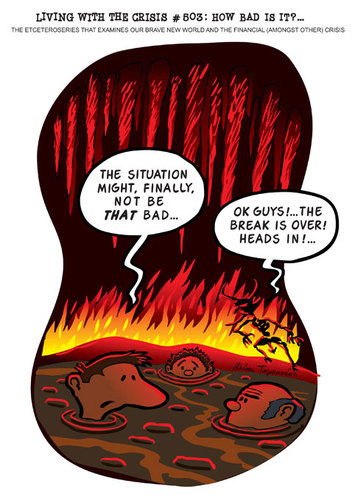 What do Greek cartoons about the situation look like?
What do Greek cartoons about the situation look like?
You can find a selection of cartoons on the Greek Cartoonist Association‘s website at and a more global view at www.north-vs-south.gr. My personal view is that there is a mix of cartoons – some with brilliant insights, some with the populist approach I mentioned above, just in the opposite direction. I like, for example, this cartoon by Tasos Anastasiou and this one by Yiannis Kalaitzis.
On a slightly different note – I have always been a non-editorial cartoonist, fascinated with the humor of the absurd, of the paradox. But a few weeks ago, I couldn’t ignore the current economic plight anymore. So lately all my cartoons are about the crisis. I realize I cannot, by any stretch of the imagination, be a Georg Grosz but at least I can be the best “etc”. And, anyhow, I haven’t really strayed far from my original intention. I still deal with the absurd and the paradox!
What do you think will happen in the next few months, crisis- and demonstration-wise?
Well, if the politicians continue to go on as they have up to now, I see the crisis deepening and the resentment growing. I do not want to be a somber prophet but I foresee a surge of anger and protest that will make the Athens riots of ’08 look like a kindergarten party.
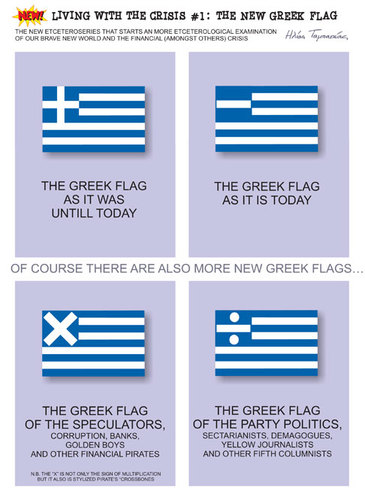 What will come out of all this?
What will come out of all this?
The people of Greece have completely lost faith in politicians. In all the Gallup polls concerning political parties and politicians, first always comes the answer “No one” by far!
If there was a serious popular movement in Greece, it could perhaps have helped towards a series of actions leading to a just solution for all. Right now organized action is confined to the strikes and demonstrations. Which I think are not enough. But perhaps a young popular movement will emerge as the crisis deepens even further. Who knows? I am not even going into a discussion about the role of the “saviors”, IMF and the EU.
Thanks for your time!
]]>Apart from that, there seems to be a widespread fear about the outcome of the current monetary crisis. In some cartoons the Euro is either sick, melting, ready to be eaten or about to kill us all, while others see it as a limitation that we probably should get rid of (1,2). In any case, there doesn’t seem to be too much confidence among cartoonists. Which may or may not be a déformation professionnelle.
Introducing…
 MonitoMan is from São Paulo, but his art is deeply influenced by Japanese comic styles. He has developed a unique style combining clear black lines and what seems to be watercolors. And he adds those red noses also found on his avatar. Although he hasn’t provided too many ‘real cartoons’ yet, I would like to point out the following illustrations: There’s a nose digging Superman resembling Akira Toriyama’s “supaman”, A Mandrill, A guy looking for reception, and Ultraman VS Gamera.
MonitoMan is from São Paulo, but his art is deeply influenced by Japanese comic styles. He has developed a unique style combining clear black lines and what seems to be watercolors. And he adds those red noses also found on his avatar. Although he hasn’t provided too many ‘real cartoons’ yet, I would like to point out the following illustrations: There’s a nose digging Superman resembling Akira Toriyama’s “supaman”, A Mandrill, A guy looking for reception, and Ultraman VS Gamera.
 Users from Berlin might already know Lola König and her/their comic strip series “Willmor”. Well.. what can I say… it’s back. And this time it’s in English (and Swedish). There’s the bungee jumper, the newspaper subscription, the beginner’s piano, and the missing remote. And several other cartoons.
Users from Berlin might already know Lola König and her/their comic strip series “Willmor”. Well.. what can I say… it’s back. And this time it’s in English (and Swedish). There’s the bungee jumper, the newspaper subscription, the beginner’s piano, and the missing remote. And several other cartoons.
Cartoons of Interest
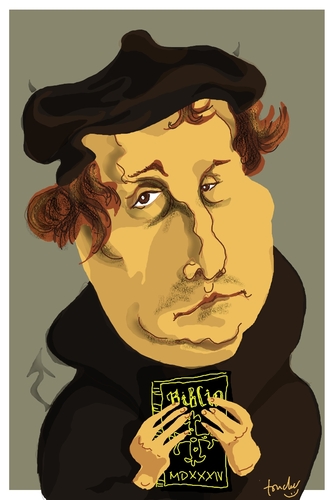 Last week several cool caricatures have been added to toonpool.com. My favourite is Bravemaina’s caricature of Martin Luther following the iconic portrait by Lucas Cranach the Elder. The artist does a great job here with his spare use of lines.
Last week several cool caricatures have been added to toonpool.com. My favourite is Bravemaina’s caricature of Martin Luther following the iconic portrait by Lucas Cranach the Elder. The artist does a great job here with his spare use of lines.
I also really enjoyed young Friedrich Nietzsche making an important decision and another Van Gogh. Although the latter admittedly has to face a lot of competition.
Finally, there’s Bernie Blackburn‘s personal “Sgt. Pepper’s” cover. Most people I recognize are from television. There’s Patsy from Ab Fab, there’s Mork, there’s that guy from American Chopper, the Blues Brothers, and what I think is Whoopi Goldberg. I might be wrong about the last one, but it still shows that I have watched my share of non-educative TV.
While toonpool.com’s artists fortunately avoided the “society of crooks” and “Nazi” stereotypes there are some cartoons that are uncomfortably aggressive toward Greece (1, 2). There are none explicitly putting the blame on Germany, there is at least one that fiercely attacks the EU (1). Since cartoons generally rely on stereotypes in order make their jokes understandable quickly, looking at them is a good opportunity to find out about stereotypes held about a particular country. In this case, Greece can clearly be summarized as antiquity (1,2,3)+ food and tourism (1,2,3) + Greek Riverdance (1). And there are two cartoons that make use of the century-old “Greeks suck at winter sports” cliché (1,2).
I guess that the two cartoons about greek vase paintings (1,2) fall into the antiquity category, but please note how they refer to different painting techniques. While Slovakian artist Tinotoons is citing the older Black-figure pottery, Christo Komarnitski from Bulgaria, preferred the subsequent Red-figure pottery to make his statement. I am sure that their individual reasons will fit into national stereotypes about Slovaks and Bulgarians respectively.
Introducing…
 Toni Malakian is from Jakarta. He has a way with watercolors, which is quite refreshing in this world of digital art. For reasons unknown to me, he also seems to have a thing for great Romanian personalities. I especially liked his portraits of poet Nichita Stănescu, philosopher Petre Ţuţea and playwright Eugène Ionescu. While I think that watercolors are more interesting, Toni also knows how to use a pen: check out these caricatures of Iranian cartoonist Hadi Heidari, China’s Hu Jintao, and Indonesian comedian Pepeng Soebardi.
Toni Malakian is from Jakarta. He has a way with watercolors, which is quite refreshing in this world of digital art. For reasons unknown to me, he also seems to have a thing for great Romanian personalities. I especially liked his portraits of poet Nichita Stănescu, philosopher Petre Ţuţea and playwright Eugène Ionescu. While I think that watercolors are more interesting, Toni also knows how to use a pen: check out these caricatures of Iranian cartoonist Hadi Heidari, China’s Hu Jintao, and Indonesian comedian Pepeng Soebardi.
Cartoons of Interest
 This cartoon by German artist Polo made me laugh out loud (“LOL”). It is called “Stevie Wonder Dials the Wrong Number”. Now imagine Stevie. Here’s the official music video . I had totally forgotten just how annoying that song was. .. and if anyone can explain the point of the video effects, please do so.
This cartoon by German artist Polo made me laugh out loud (“LOL”). It is called “Stevie Wonder Dials the Wrong Number”. Now imagine Stevie. Here’s the official music video . I had totally forgotten just how annoying that song was. .. and if anyone can explain the point of the video effects, please do so.
I would also like to point out this stunning caricature of the new coach of Turkey’s national football team. He sure looks like an evil dwarf. And his skin looks as if he really likes red wine or booze in general.
Finally, here’s a new take on what must be the most frequently cartoonized painting ever. While you are at it check out all the other versions as well.
Paul Hellmich with some assistance by Earldonsax
]]>


